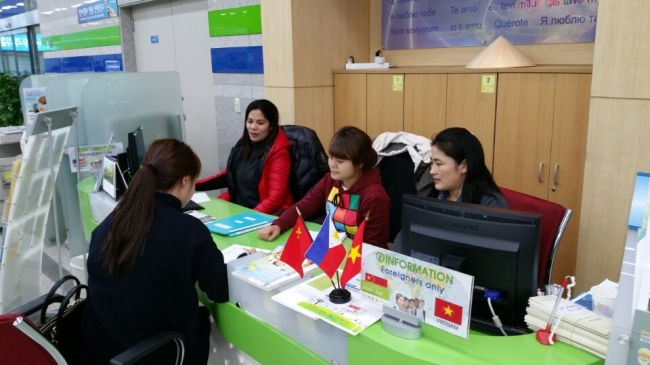On a busy morning at Seongdong-gu’s community service center in eastern Seoul, a Chinese woman entered, looking confused. Cautiously peering around, the woman appeared lost until she heard a familiar language from the other side of the room.
“May I help you?” said 44-year-old Chinese worker Chen Jhi-hong in her mother tongue.
The woman rushed to Chen as though she had found a savior. Chen asked for help in changing her home address for her registration. After a smooth process carrying out the task, the woman left feeling satisfied and protected.
 |
Three women from multicultural backgrounds help a foreign resident at Seongdong-gu Office in eastern Seoul. (Seongdong-gu Office) |
Chen is one of three Korean-speaking workers with non-Korean backgrounds at the office. She provides administrative support for foreign residents. Interpreting and translating in her mother tongue for expats, she serves as an important connection between the Korean community and Chinese residents.
Adjusting to Korean society was not smooth for Chen, like many other expats in Korea.
Chen came to Seoul in 2003 after marrying a Korean man. At first she struggled with cultural barriers and lost confidence when she was engaging in social activities.
“I stayed home until my son was able to go to kindergarten. One day, my 5-year-old cried, saying his teacher seemed to dislike him. I wanted to ask the teacher what was going on but I couldn’t because I had not learned Korean,” she said.
After that incident, she put enormous effort into studying Korean. Reminiscing about the difficulties she faced in the past, Chen has worked at the Seongdong-gu Office since last year in the hopes of helping others with similar hardships.
“Whenever Chinese people thank me, I feel touched. It makes me realize that I can do something meaningful for others,” she said. “I’m so grateful to be here.”
As successful as Chen’s job may be, her opportunity to help is still a rarity.
As of January, 19 foreigners worked for the Seoul Metropolitan Government, including at district offices. Of the 25 district offices in the capital, seven have hired 10 foreign workers. Among them, only four are marriage immigrants with multicultural backgrounds, with three working at Seongdong-gu Office and one at Songpa-gu Office. The employees are hired as contracted workers and are yet to secure regular positions, according to the city.
Like Chen, Kim So-yeong from the Philippines also benefited from the opportunity to help, which she attributes to her Korean-language skills. She was naturalized as a Korean citizen after marrying a Korean in 1997.
To make a living for her two daughters, Kim first worked at a private company and academy before moving to the Seongdong-gu office in 2011. The 43-year-old Filipino is in charge of supporting English-speaking foreigners.
“Many expats visiting here to ask me about job recruiting opportunities. I hope there are some training programs in which foreigners can learn useful skills and acquire certificates,” she said.
Letiphuonghni from Vietnam works with Kim. She heard about the job two years ago from the Multicultural Family Support Center, which is run by the government.
She mainly deals with interpretation and translation for Vietnamese residents.
The 28-year-old adjusted relatively easily to her new environment.
“Although the language difficulty still bothers me sometimes, I enjoy living here. I love Korean food and the transportation system here,” she said. “Even though I cannot see my family in Vietnam, everything is good here.”
While she appreciates her job at the office, she still sometimes faces prejudice.
“Even though there are a lot of multicultural families with Vietnamese roots here, some still view me with prejudice. I wish they see me with open-mindedness as just another Korean,” she said.
By Lee Hyun-jeong (
rene@heraldcorp.com)






![[Exclusive] Hyundai Mobis eyes closer ties with BYD](http://res.heraldm.com/phpwas/restmb_idxmake.php?idx=644&simg=/content/image/2024/11/25/20241125050044_0.jpg)
![[Herald Interview] 'Trump will use tariffs as first line of defense for American manufacturing'](http://res.heraldm.com/phpwas/restmb_idxmake.php?idx=644&simg=/content/image/2024/11/26/20241126050017_0.jpg)
![[Herald Review] 'Gangnam B-Side' combines social realism with masterful suspense, performance](http://res.heraldm.com/phpwas/restmb_idxmake.php?idx=644&simg=/content/image/2024/11/25/20241125050072_0.jpg)